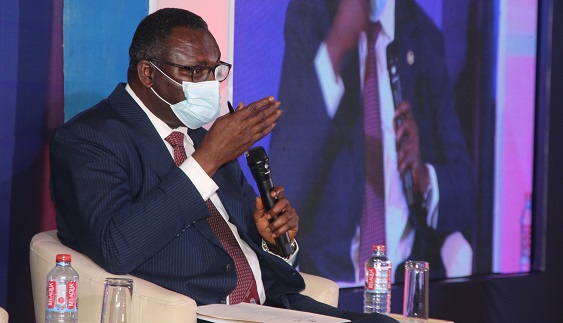
Expand tax coverage: Dr Ali-Nakyea tells govt at Graphic/Stanbic forum
A financial consultant and Senior Lecturer at the School of Law, University of Ghana, Dr Abdallah Ali-Nakyea, has called on the government to use the 2022 Budget to broaden the tax net to raise more revenue.
He said expanding the country's tax net to cover new people would shore up government revenue inflow to fund development, without necessarily introducing new taxes.
Dr Ali-Nakyea, who is also a tax expert and lawyer, made the call at the fourth quarter Graphic Business/Stanbic Bank Breakfast Meeting in Accra last Tuesday.
He was a special guest and panel member at the meeting, the last in the series for the year, dedicated to collating ideas on critical national issues for consideration in the 2022 Budget, which is expected to be presented to Parliament this month.
Other panellists were a Senior Lecturer at the Ghana Institute of Management and Public Administration (GIMPA), Dr Randolph Nsor-Ambala, and a Senior Lecturer at the Department of Economics, University of Ghana, Dr Priscilla Twumasi Baffour.
Meeting
Participants were engaged on insightful topics such as: “The new thinking around revenue mobilisation through digitalisation”, “Effective national fiscal policy management and benefits to the private sector” and “Creative economic planning in the private sector”.
The meeting, an initiative of the Graphic Communications Group Ltd (GCGL), was sponsored by Stanbic Bank Ghana Limited, a first-tier universal bank, with support from the Labadi Beach Hotel, where the event was held.
Digitalisation
As part of the expansion drive, Dr Ali-Nakyea suggested that professional bodies had to make tax clearance certificates prerequisites for admitting members to the bodies and practising their professions.
He also stressed the need for the country to pass the Tax Exemption Bill into law to broaden its revenue base by curtailing unnecessary exemptions.
The tax expert also said some of the laws that put a lot of pressure on the private sector had to be looked at to create a friendlier business environment.
Dr Ali-Nakyea commended the government for the digitalisation drive towards expanding the tax base.
Property taxes
Dr Baffour also proposed that the country should go back to property taxes through a simple automation to plug the loopholes, while urging the government to ensure value for money by providing basic social amenities such as roads, electricity, water and others to justify the collection of rates.
She pointed out that the budgetary allocation of capital expenditure — investments in physical infrastructure and other assets — was consistently dwindling.
That should place the focus on realising real value from the exploitation of our natural resources, she added.
On the labour market, the economist posited that the current free senior high school policy was good, but it should be reviewed to ensure that children of poor people benefitted from it, while those who could afford to pay their children’s fees were allowed to do so.
That, Dr Baffour stated, would enable the country to produce quality students who would be able to compete globally.
For his part, Dr Nsor-Ambala said the restrictive excise tax regime added up to the burden on businesses and, therefore, entreated the business community to use its advocacy group to ensure that there was fairness and equity to lessen the burden on businesses.
“We should rationalise our taxes to deal with the cascading effects on businesses, so that they do not have cash-flow problems," he observed.
He said taxes were supposed to be paid after profit was made and called on the government to create a conducive environment for the private sector to grow.
Expectations
Some key players in the private sector who participated in the meeting, including the Country Senior Partner of PricewaterhouseCoopers (PwC), Mr Vish Ashiagbor, urged more equitable ways of applying taxes.
The Executive Secretary of the American Chamber of Commerce, Mr Simon Madjie, said the 2022 Budget should initiate policies to promote the country as a favourable destination to attract more foreign direct investments (FDIs).
The President of the Ghana Union of Traders Associations (GUTA), Dr Joseph Obeng, for his part, said the bane of the country was how to get value for money for the revenue generated and prioritise government expenditure.
“We in our association have started showing signs of fatigue and urge the government to find ways of plugging the loopholes in the tax system; there is the need to look at existing taxes," he pointed out.